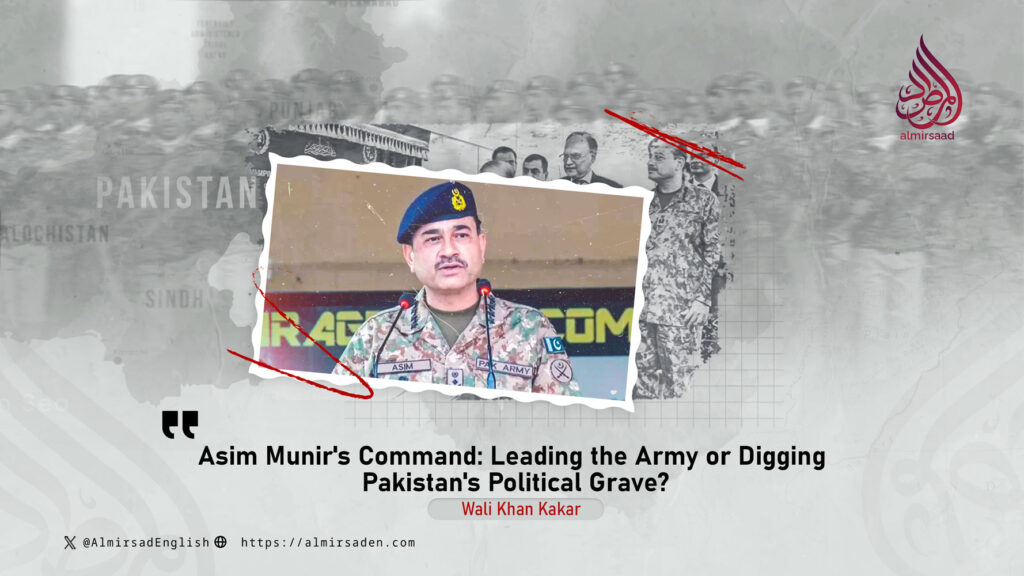By Wali Khan Kakar
Pakistan stands at one of the most perilous crossroads in its history, gripped by overlapping political, security, and economic crises. At the heart of this turmoil lies the military establishment itself, fractured by internal rivalries, personal ambitions, and a loss of strategic direction. Under General Asim Munir’s command, the army has drifted away from its professional duties, choosing instead to serve narrow interests, settle political scores, and tighten its hold on power at the expense of national stability.
Munir’s leadership has not only widened the divide among political parties but also deepened discord within the military’s own hierarchy. His concentration of authority, intolerance toward dissent, and disregard for public sentiment have together accelerated Pakistan’s institutional decay and political paralysis.
These interventions have corroded public trust and damaged the credibility of state institutions, leaving Pakistan increasingly isolated on the global stage. The country is now seen as one struggling to preserve internal order while offering little to regional peace or cooperation.
The consequences of this disorder extend far beyond administrative failure. Pakistan’s instability has provided fertile ground for the revival of extremist networks such as ISIS, turning the country into both a sanctuary and a sponsor of chaos. The group’s expanding presence, the support it enjoys, and its selective use in regional conflicts suggest a deliberate strategy of manipulation. Yet this short-sighted policy is bound to backfire, deepening insecurity and pushing the state toward further fragmentation.
Inside the armed forces, serious divisions have surfaced, with visible rivalries between the Inter-Services Intelligence (ISI) and other security agencies. The systematic weakening of civilian authority has only worsened the crisis, stripping governance of direction and legitimacy. What were once manageable differences of opinion have now become open struggles for power, influence, and control of national policy.
The discipline and unity that once defined the military as the backbone of national strength have eroded into mistrust and competition. The ISI’s covert operations, once shrouded in secrecy, now clash openly with other branches of the security establishment, leaving Pakistan’s defense and security policies in disarray.
Meanwhile, civilian institutions have been reduced to mere formalities. Elected governments function largely as symbolic bodies, while dissenting voices are stifled through coercion and censorship. The bond that once linked the army and the people has broken down, replaced by resentment, anger, and protest. What began as quiet discontent has evolved into open defiance, sharp criticism, and direct accusations against the military leadership. This widening rift now threatens not only the army’s credibility but the very future of the Pakistani state.
Rather than confronting these realities, the ruling establishment has sought to mask its failures with distraction. Instead of pursuing meaningful reform, it has turned outward, meddling in the internal affairs of neighboring states to divert public and international attention from its domestic collapse. This reckless approach has deepened mistrust with Afghanistan, India, Iran, and others, eroding what little regional goodwill remained and heightening the risk of renewed conflict.
Economically, the country is in freefall. The rupee continues to lose value, the cost of living has surged, and unemployment and poverty are reaching historic highs. Major financial institutions, including the IMF and World Bank, are reassessing their confidence in Pakistan’s economic management, while foreign investors withdraw their capital in search of stability elsewhere.
Public frustration, political paralysis, and growing diplomatic isolation have hollowed out the state from within. Signs of institutional collapse are visible across every sector. If this trajectory continues, Pakistan risks not only losing its international relevance but facing an internal implosion that may soon become irreversible.
These are the hallmarks of General Asim Munir’s tenure, symbols not of progress but of decline, not of unity but of disintegration. Unless Pakistan’s political leadership, civil society, and religious scholars unite to demand real reform, cleanse the military of corruption and political interference, and confront extremism with sincerity, the current crisis will only deepen.
What Pakistan needs now is a national renewal built on accountability, transparency, and public trust. Restoring the balance between civilian and military institutions, depoliticizing governance, and recalibrating foreign policy based on mutual respect are essential first steps. The window for change is closing quickly, and the choice before the Pakistani people is stark: renewal through reform or ruin through repetition.
